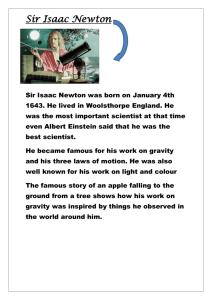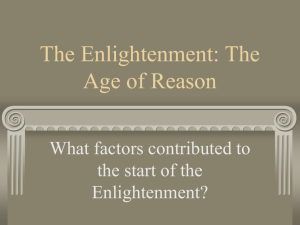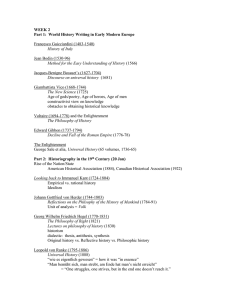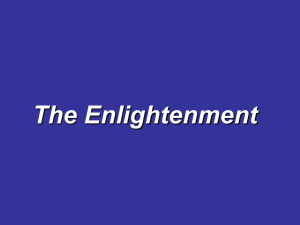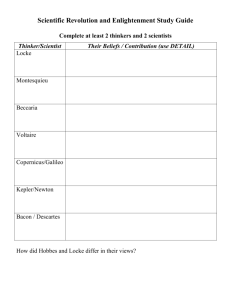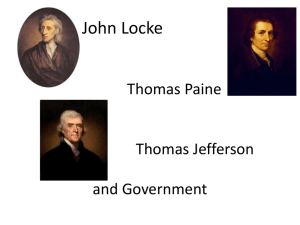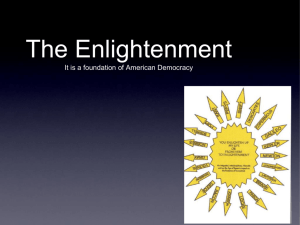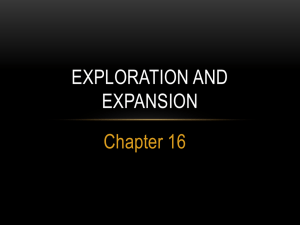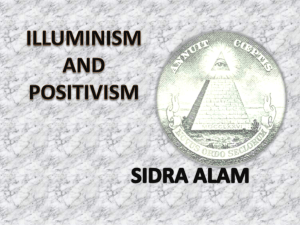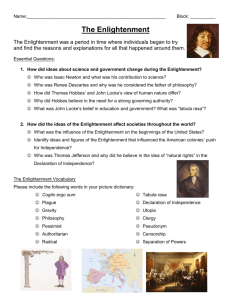Enlightenment
advertisement
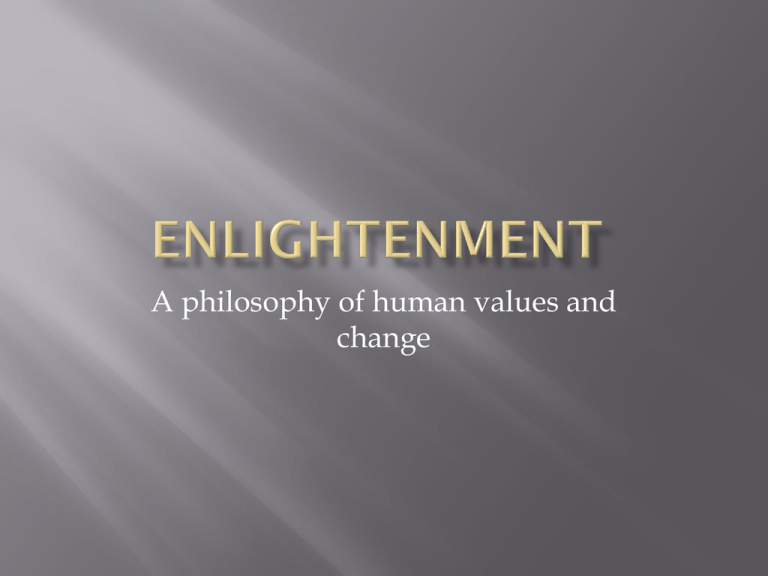
A philosophy of human values and change 30 Years War: 1618-1648: German writers began to criticize nationalism and war Hugo Grotius and John Comenius were two early Enlightenment thinkers Studies began in science, particularly astronomy Johannes Kepler and Galileo Galilei Rene Descartes and Francis Bacon revised the scientific method and physics with Isaac Newton Based on observation of the world and testing its validity This caused scientist to be criticized and scorned Studied the world by defining ideas their own way, based on science Perceived the universe as a machine governed by fixed laws Believed in progress, or the idea that the world and its people could be improved Philosophical, scientific, artistic and political revolution were valued Spread new ideas, supporters of the political ideas of John Locke and scientific methods of Isaac Newton Disapproved superstitions about new scientific endeavors Believed in both freedom of speech and individual liberty France was the center of these ideas in the 1600-1700s Gathered in salons held in individual homes Questioned whether human society could be improved by reason and denied the ability of rational thought to reveal universal truths Believed that the perceived world is relative to the beholder and no one can be certain about truth Immanuel Kant argued that man could not know observed objects or metaphysical concepts The experience of these things depends on the psyche of the observer Due to competing ideas such as Romanticism, Skepticism French Revolution Thomas Hobbes main concern was social and political order Believed that we should give our obedience to an unaccountable sovereign otherwise the “state of nature” would be war Wanted to avoid insecurity Leviathan, 1651 Felt that by nature, people were self-serving and preoccupied with gathering limited resources Need a single absolute ruler to control these urges Man earns ownership and right to property when he labors for it Government should be limited to securing the life and property of its citizens and is only needed in an ideal state Believed in the right of conscience and religion, except when religion is intolerant Two Treatises of Government,1690—promoted representative type of government Spirit of Laws explains separation of powers and checks and balances Every government has 3 sorts of power: legislative, executive and judicial Executive enacts laws and makes peace or war Judicial punishes criminals and settles disputes Political liberty arises from tranquil living and feeling of safety If the legislature and executive are the same person, then there is no liberty, but tyranny If judiciary cannot be separate, then there cannot be any fairness is punishment “Man is born free, but he is everywhere in chains” Repressed physical freedom Political authority comes from a social contract between the political power and the people under it Sovereign (collective people) are one people and expresses public concerns for the good of all Rousseau recommends a mediator between the government and people because they are always in conflict Wrote The Social Contract, 1762 that favored a government based on small direct democracy, focused on the people Tolerance of religions and ethnicities “It does not require great art, or magnificently trained eloquence, to prove that Christians should tolerate each other. I, however, am going further: I say that we should regard all men as our brothers. What? The Turk my brother? The Chinaman my brother? The Jew? The Siam? Yes, without doubt; are we not all children of the same father and creatures of the same God?” Voltaire wanted to bring social and political change through the use of satire and criticism. He wrote Candide Salon: intellectual gatherings Classicism: ideas that centered on Greek and Roman ideas Philosophes: new ideas such as Locke’s political philosophy and Newton’s scientific method that believed in freedom to question, prove and supported freedom and individual rights. Enlightened Despots: rulers who sought Enlightenment principles while still having royal powers Metaphysics: branch of philosophy that is concerned with spiritual ideas Romanticism: a cultural movement that celebrated emotion and the individual ending the Age of Enlightenment Natural Law: a universal moral law that is understood by using reason Natural Rights: rights belonging to all people from the time they are born Deism: the belief in God, but not recognizing organized religion, declaring that it exploits people. Religion is based on reason and natural law Scientific Method: developed by Francis Bacon in which the scientist begins with an observation of facts and images, then finds a hypothesis to explain them. Through the use of experimentation, the scientist tests the hypothesis to see if it is true. If proven true, it becomes scientific law through reason. World History: The Human Experience, The Modern Era by Mounir A. Farah and Andrea B. Karls, Glencoe/McGraw-Hill, New York, New York, 2001.
